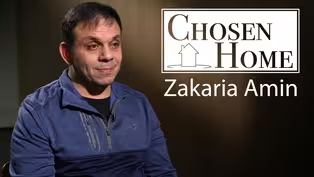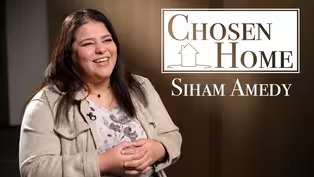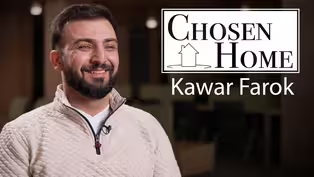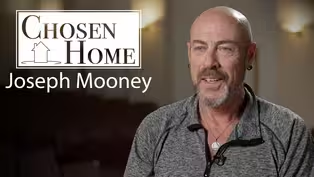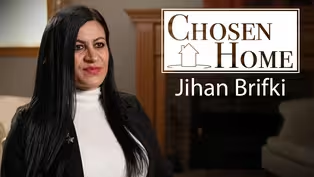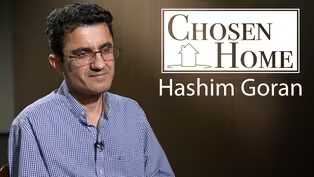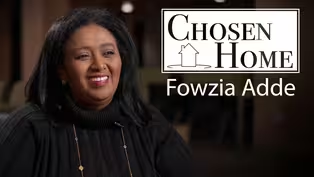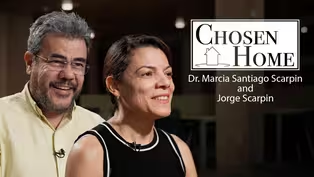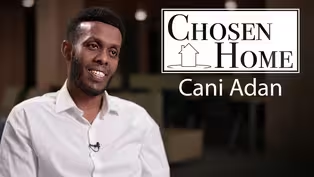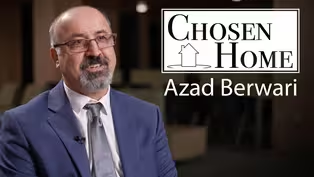Chosen Home: Azad Berwari
Clip | 5m 46sVideo has Closed Captions
Azad Berwari shares his immigration story
Azad Berwari shares his immigration story of fleeing Iraq and how he accomplished his dream of studying at an American university.
Problems playing video? | Closed Captioning Feedback
Problems playing video? | Closed Captioning Feedback
Chosen Home: Azad Berwari
Clip | 5m 46sVideo has Closed Captions
Azad Berwari shares his immigration story of fleeing Iraq and how he accomplished his dream of studying at an American university.
Problems playing video? | Closed Captioning Feedback
How to Watch
is available to stream on pbs.org and the free PBS App, available on iPhone, Apple TV, Android TV, Android smartphones, Amazon Fire TV, Amazon Fire Tablet, Roku, Samsung Smart TV, and Vizio.
- My name is Azad Berwari, and I live in Moorhead, Minnesota.
I'm from Kurdistan, which would be northern Iraq.
I was a heavy reader back home, and it was a dangerous thing in Saddam's era.
If you studied books, they would keep an eye on you, so you are active maybe socially or politically or with human rights.
I read about the European Westerner societies.
So I read Hemingway, I read Edgar Allan Poe, some other American authors, but that attracted me the Western civilization in general.
It was something very interesting.
It was quite different with the culture that where I grew up.
I always had a dream about studying at an American university.
I remember when I was too young back home when I was telling I dream about studying at an American university, my friends were laughing so badly at that time because it was like as if you say, next week I'm gonna be on Mars.
It's, of course, impossible.
It was like that at that time.
It wasn't a choice.
When we fled Iraq and we were in refugee camps in Turkey, different delegates came and after interviews with United Nation, UNHCR, they assigned us to the front lists of the countries.
The delegate from that country would be there and would interview us and decide either to take those people or not.
And I became a refugee in Sweden.
So after I came to Sweden and I became a Swedish citizen, I could get student loan for studying abroad.
So I came to the United States as an international student in '98, and then I came to NDSU and I studied sociology.
I get a Bachelor and a Master's of Sociology and a doctoral degree in Emergency Management.
First year college was a really challenge because I started studying sociology and your strength is language when I didn't have it.
I wasn't 17, 18-years old to very smoothly go through learning language.
English is my fourth language so language was a challenge.
It took some time.
I grew up in a mountainous area, and here you look at every direction is just flat.
And I always heard Red River Valley.
So I became a friend with a girl who was at NDSU studying as well.
And I told her one time, "Let's go to the valley.
Where is the valley?"
She said, "Here is the valley."
I said, "Where?
I haven't seen anywhere as flat as here, Where is the valley here?"
And when she said, "Here is the valley.
We are in the valley."
I said, "All right, okay."
In my way of recognizing a valley, this is not a valley.
(Azad laughs) I have one child, a 15-year-old child.
I try to do my best to raise her, be bilingual, bicultural because it's a great strength.
But for a child, it's not easy to have family values different than school values and mainstream values.
Home is something that where you grew up, you internalize social values, cultural values, what's right, what's wrong, what's rewarded, what's sanctioned.
You grew up with those dreams.
And when I was a teenager, Saddam's forces pulled us out of our homes and burned the village in front of us.
So for me, home is burned, doesn't exist anymore.
If you say home, I have a home.
I purchased a property years ago, but it's never home because the home was burned and doesn't exist anymore.
If you are forced out of a home and burned, then there is no home.
If you voluntarily leave that home and choose another home, that's a small transition.
You choose, you're not forced.
It's voluntary.
For us, many people like me, I don't have a home.
I have many homes.
I had a home in Sweden, I had a home at NDSU.
I have a home where I live now, but it's never the home that was burned.
So I do my best to give that peaceful environment for my daughter to grow up in it and have her dreams come true hopefully.
(gentle music) - [Presenter] Funded by the Minnesota Arts and Cultural Heritage Fund with money from the vote of the people of Minnesota on November 4th, 2008, and by the members of Prairie Public.
Video has Closed Captions
Clip | 6m 13s | Zakaria Amin shares his immigration story. (6m 13s)
Video has Closed Captions
Clip | 4m 36s | Siham Amedy shares her immigration story. (4m 36s)
Video has Closed Captions
Clip | 6m 18s | Kawar Farok shares his immigration story. (6m 18s)
Video has Closed Captions
Clip | 4m 24s | Joseph Mooney shares his immigration story. (4m 24s)
Video has Closed Captions
Clip | 5m 59s | Jihan Brifki shares her immigration story. (5m 59s)
Video has Closed Captions
Clip | 7m 45s | Hashim Goran shares his immigration story. (7m 45s)
Video has Closed Captions
Clip | 6m 14s | Fowzia Adde shares her immigration story. (6m 14s)
Chosen Home: Dr. Marcia Santiago Scarpin and Jorge Scarpin
Video has Closed Captions
Clip | 7m 25s | Dr. Marcia Santiago Scarpin and Jorge Scarpin share their immigration story. (7m 25s)
Video has Closed Captions
Clip | 5m 19s | Cani Adan shares his immigration story. (5m 19s)
Video has Closed Captions
Clip | 5m 46s | Azad Berwari shares his immigration story (5m 46s)
Providing Support for PBS.org
Learn Moreabout PBS online sponsorshipSupport for PBS provided by:
